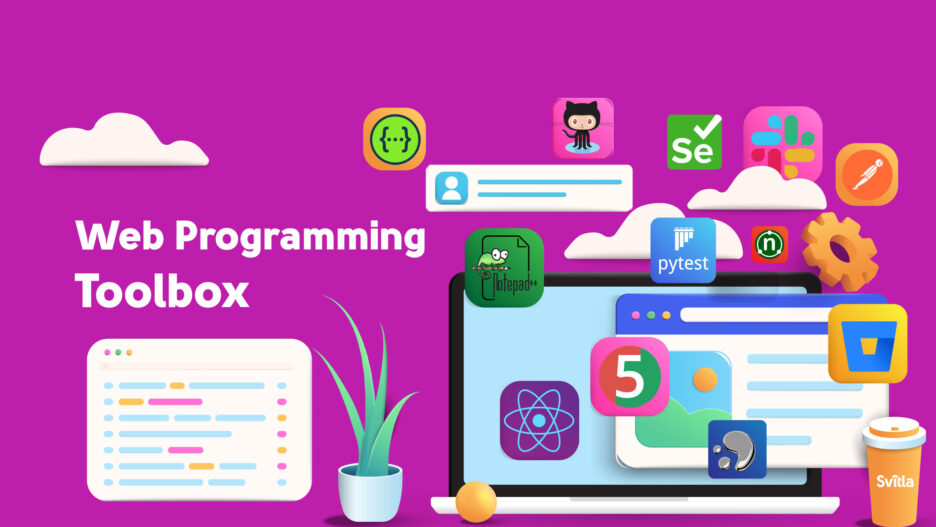The best applications for web development matters
Modernized web technologies, architectures, and practices are essential to expedite the digital transformation of businesses. Responding rapidly to customer needs is essential, and with a plethora of web tools, technologies, and programming solutions, it’s crucial that web developers choose the right tools for their toolbox.
Organizations increasingly rely on web solutions to operate several aspects of their business, and in order to reduce technical complexity, web developers are always in the search of new, event-driven tools that help improve the experience and increase agility by streamlining development, deployment, and operations.
Web development tools are applications and software that helps web developers program, test, and debug code and interface elements to build a website or web application. These tools don’t actually build the website or web application, instead, they help make web development easier.
Think of tools like Slack, Figma, or even online forums like StackOverflow…these can all be part of the web development toolbox. Moving beyond the traditional definition of development tools (or dev-tools for short), the aim of this blog is to give you a realistic overview of the tools and software services you can leverage as a web developer to improve your day-to-day workflows.
You’ll see some fan favorites, some you may not have heard before, and some that you may have heard of but never tried. All in all, we expect you’ll find this article resourceful and effective as you pick and choose the best tools to make your web development toolbox more robust.
Code Editors
Code and text editors are the bread and butter for web developers, and choosing the right one is nothing short of a pretty big deal. You see, once web developers choose their preferred text editor, they’re in it for the long run, kind of like a wizard choosing their wand (although the wand chooses the wizard but that’s a different conversation).
Here, we list out some code editors in which you can’t go wrong:
Atom
Self-proclaimed as the hackable text editor for the 21st century, Atom is an open-source text editor that works across operating systems, helping web developers write code faster with smart and flexible autocomplete. The Atom interface can be split into multiple panes to compare and edit code across different files, letting users search for and install new packages, easily browse and open files and projects in one window, and preview and replace text as it's typed in a file or across all projects. It is built with HTML, JavaScript, CSS, and Node.js integration, running on top of Electron, which is a framework for building cross-platform apps using web technologies.
Notepad++
If functionality is your thing and aesthetic isn’t high on your list of criteria when choosing a code editor, then Notepad++ is for you. This open-source code editor was created by Don Ho who is an advocate of being energy conscious in development tasks Notepad++ supports multiple languages and runs on the MS Windows environment, as it’s governed by the GNU General Public License. Based on Scintilla, Notepad++ is written in C++ and uses Win32 API and STL for higher execution speed and smaller program size (remember we said Notepad++ is not as aesthetic?). Notepad++ is focused on reducing the world’s carbon dioxide emissions by using less CPU power, resulting in a greener environment.
Geany
A free and open-source code editor that provides powerful, stable, and lightweight features without compromising workflows. Running on Linux, Windows, and macOS, Geany is translated to more than 40 languages and has built-in support for more than 50+ programming languages. Geany hits the sweet spot between being lightweight, cross-platform, flexible, and powerful. Geany offers many customization tools, letting users adjust settings to their needs. It also packs an impressive plugin system so web developers can easily add new features or improve existing ones.
Source Control Tools
Version software source control systems help web developers keep track of changes, enable teams to work on the same file at the same time, work on an interface to visually see two versions of the same file, and solve issues as needed.
Here, you’ll see some source control tools that have positioned themselves in the industry as the golden standard:
Git (Github)
We know you’ve heard of this one. GitHub is where millions of developers and companies come together to build, ship, and maintain software, as it’s the largest and most advanced development platform in the world. Git for source control provides a collaborative coding environment where contributors can quickly add to their projects within an automatic setup. Favored by large development teams, GitHub gives developers the tools to collaborate, review, and manage application code.
Bitbucket
Advertised as more than just a Git code management tool, Bitbucket helps teams plan projects, contribute to code, test, and deploy, all in one place. One of the things that make the pipeline Bitbucket stand out is its ability to integrate seamlessly with first and third-party tools to reduce context-switching and improve code quality. Leveraging CI/CD benefits, Bitbucket lets developers build, test, and deploy quickly with fast feedback loops, as well as perform quick code reviews in Bitbucket.
Mercurial SCM
Fast and powerful distributed source control management tool that is free, open-source, and flexible enough to handle projects of any size with an easy and intuitive interface. Mercurial keeps project history when you clone projects, ensuring most actions are local, fast, and convenient. With support for multiple workflows and the ability to leverage an array of functionality with extensions, Mercurial is easy to get used to with simple branching, as one of the best IDE for web developers.
Testing and Debugging Tools
Ah, testing. All successful products undergo plenty of testing exercises, ensuring quality is there and thriving. There are many types of testing out there, including unit testing, integration testing, and functionality testing.
Here are some of the best web application testing tools and debugging tools out there for you to take advantage of:
JUnit
A unit testing framework that is exclusively designed for the Java programming language. JUnit is a staple of test-driven development and is part of the unit testing framework family that is collectively known as xUnit. The latest version of JUnit, which is JUnit5, is the foundation for developer-side testing that focuses on Java 8 and above.
PyTest
Dubbed as the easiest testing framework in Python, Pytest is simple, compact, and efficient. The goal of PyTest is to enable developers to write small, readable tests that can easily scale to support complex functional testing for apps and libraries. Some of its key features include auto-discovery for test modules and functions, modular fixtures, out-of-the-box unit tests, nose test suites, and a rich plugin architecture with over 800 external plugins.
NUnit
As its name suggests, NUnit is a unit testing framework that is specifically designed for all .NET languages. Ported over from JUnit, NUnit is completely rewritten with new features and support for .NET platforms. This evolving open-source framework is an aspect of test-driven development that is part of the Extreme Programming paradigm.
Selenium
Open-source umbrella project for software automation testing tools and libraries that support web browser automation. Founded in 2004, Selenium has become something of a synonym when talking about testing automation thanks to its robust suite of tools for software developers to automate web browsers with extreme ease.
Cypress
Powerful open-source front-end development tools for testing that help developers boost processes via a simple interface that lets you set up, write, run, and debug tests quickly. Cypress lets developers write all sorts of tests, including end-to-end tests, unit tests, and integration tests. Thanks to key differentiators like snapshot tests, automatic waiting, behavior control, and more, Cypress is a fan favorite among web developers.
WebDriverIO
Open-source testing automation framework that is written in the JavaScript language and runs on NodeJS. WebDriverIO has made a name for itself as being especially useful for testing web applications and native mobile applications for iOS devices. This framework lets developers automate any application written with modern web frameworks such as React and Angular, to name a few.
React Developer Tools for Chrome
Collection of debugging tools for the Chrome Developer Tools, serving as an extension for the open-source React JavaScript library. This framework lets developers inspect the React component hierarchies in the Chrome Developer Tools.
Angular NG-Inspector for Chrome
Browser extension that lets developers see an inspector panel of the AngularJS scope hierarchy in real-time, as well as controllers or directives associated with each scope.
Best Test Management Tools: A Comprehensive Guide
Documentation Tools
NDoc
Documentation generator for the Common Language Infrastructure and licensed by the GNU General Public License. Stemming from an assembly file produced by compiling source source and pre-generated XML documentation, NDoc generates docs with ease thanks to its plugins to support many output formats, MSDN-style HTML Help format (.chm), the Visual Studio .NET Help format (HTML Help 2), and MSDN-online style web pages.
JavaDoc
Documentation generator created for the Java language to create API documentation in HTML format.
Swagger
Interface Description Language tool that helps developers describe RESTful APIs using JSON. Coupled with open-source tools, Swagger is an API documentation tool that helps document and use RESTful web services thanks to its automated documentation, code generation, and test-case generation.
PyDoc
Automated documentation generator for Python modules. Documentation can be displayed as pages of text in a console, on a web browser, or saved to HTML files.
Web Development Best Tools: Network and API
POSTMAN
One of the most widely used software development tooling, Postman delivers simple and complex features, becoming the go-to solution to build and use APIs. The Postman APIs platform simplifies the API lifecycle and streamlines collaboration to create better APIs at a faster pace. Postman packs a comprehensive set of tools that comprise the design, testing, documentation, mocking, and discovery of APIs. It also comes with a repository that easily stores, helps iterate, and boosts collaboration around API artifacts in one central platform.
Chrome DevTools
Set of website development tools built for the Google Chrome browser. It lets developers edit pages quickly and detect problems almost instantly to help build better websites.
RapiDoc
API documentation generator from OpenAPI Specification. RapiDoc is free of frameworks, setups, configurations, steps, or packaging and can be used with any framework.
Old School, but Forever Tools: Free Software for Programming
grep and regexp
Grep, which stands for global regular expression print, is a command-line utility to search for plain text data sets for lines that match a regular expression. The grep tool searches for specified patterns using regular expressions, which are text strings that describe a particular search pattern.
Vim
Text editor that uses keyboard shortcuts to accelerate development tasks. This highly configurable text editor lets users create and change any kind of text.
Emacs
Similar to Notepad, Emacs is a text editor that interprets emacs lisp, which is a dialect of the Lisp programming language with extensions to support text editing.
Shell
A command-line interpreter that comes with a command-line interface and Unix-like operating system. It is both an interactive command language and a scripting language used to control the execution of the system using shell scripts.
Project Management Tools for Software Developers
Jira
Developed by Atlassian, Jira is one of the best project management tools with 83% of Fortune 500 companies favoring it for effective, agile, and innovative project management solutions. Jira is best known for its proprietary issue-tracking capabilities that allow bug tracking and agile project management.
Trello
Web-based, Kanban-style app that is also developed by Atlassian to create lists and help teams collaborate, manage projects, and reach improved productivity.
Slack
Slack: Marketed as the place where the future works, Slack is a proprietary business communication platform that includes persistent chat rooms organized by topic, private groups, and direct messaging.
Basecamp
All-in-one platform that helps web development teams collaborate more easily by providing the needed tools to manage work effectively and communicate seamlessly. It tracks tasks, deadlines, files, discussions, and announcements.
ClickUp
Tool to plan, track, and manage all work items with project management solutions for the needs of web development teams. This cloud-based solution features communication and collaboration tools, task assignments, statuses, alerts, and more. clickup.com
Choosing the Best Applications for Web Development with Svitla Systems
We could go on and on, but more so than listing out some of the most popular and predominant web programming tools out there, we believe it’s equally important that you assess and define your unique business needs to find the right tools that cater to what your organization needs.
Svitla Systems web developers are experts in many of the tools listed in this post, which gives us the competitive edge to explore the best-fit solution for your projects. If you’re interested in learning more about what tools can help accelerate your web development needs and maximize your investment in terms of time, resources, and budget, you can contact our experts for a more in-depth conversation about how we can help you choose the best applications for web development.





